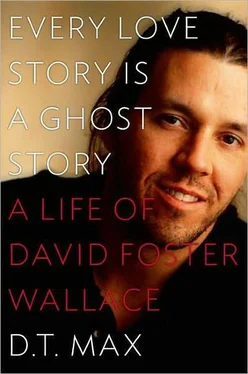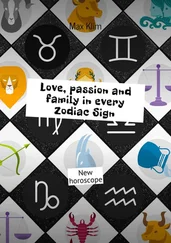When extra teaching didn’t stimulate his creativity, Wallace thought about not teaching. He had not forgotten that he had done his best work away from the classroom. Other times he blamed his lack of discipline. He imagined a more perfect version of himself and scribbled it on a sheet of paper one day:
What Balance Would Look Like:
2–3 hours a day in writing
Up at 8–9
Only a couple late nights a week
Daily exercise
Minimum time spent teaching
2 nights/week spent with other friends
5 [recovery meetings a] week
Church
“I’m back to thinking IJ was a fluke,” he wrote on another sheet:
I feel nothing lapidary inside. “Until there is commitment, there is only ineffectiveness, delay.” Goethe. How to make a commitment — to writing, to a somewhat healthy relationship, to myself. How to schedule things so that a certain portion of each day is devoted to writing. How to save money so that I can take Fall ’97 off.
This last he acted on. He asked DeLillo to recommend him for a Guggenheim Fellowship, then four days later canceled the request. “A weird lightning-bolt fellowship” had come his way, he reported. The Lannan Foundation in Santa Fe had awarded him $50,000, “which means,” he wrote Steven Moore, who had helped arrange the grant, “I can take an unpaid year off next year and face writing fears head on.” But the prospect of a whole year without classes, Wallace wrote DeLillo, caused him “basically to have projected my own superego out onto the world and thus imagine that THEY expect-nay-demand an exhilarant piece of novel-length prose at the end of my grant time, which I know is horseshit but still makes it hard to breathe.” He asked again why he could not find DeLillo’s discipline—“you quiet, deeply serious guys who take time and publish only finished, considered stuff.” He was becoming as afraid of having too much time as not enough.
God, as Wallace liked to point out, being “nothing if not an ironist,” the year after he won the Lannan, the MacArthur Foundation gave him an award of $230,000, which, together with the Lannan money and the income from his books, effectively freed him from the need to teach. The receipt of a so-called genius award was acutely uncomfortable for Wallace. It sat just the wrong side of his worry that he was a high-level entertainer who could be bought by what he called, in a letter to Markson, “the blow-jobs the culture gives out.” He did not like the idea of being celebrated for who he was, as opposed to what he had written or was currently trying to write. Accepting the award was as risky as taking an advance on a book — worse psychologically, really, because you got to keep the funds either way. The only one who could punish you for not living up to expectations would be yourself. He did not really need the money either. His only big cost was health insurance, which ISU provided. He went nowhere and bought little — he drove an old car, and malls, he told friends, made him sad. To expiate the burden, no sooner did he have the funds than he tried to get rid of them. He lent money to ex-girlfriends and gave it away to friends in his recovery group to pay for their children’s college tuition. He offered to fund other friends’ worthy projects — one wanted money to help her write a study of childhood sexual abuse. He bought a pickup truck. One day in class he mentioned he couldn’t figure out where it had gone. He was embarrassed when a student brought forward the keys and told him he had lent it to her several weeks before.
Anxiously, he went into his year off. “I am getting some writing done,” he wrote Moore in September 1997, after a summer on his own, “though not of course as much or as well as I like.” He wrote in the margins of a notebook around the same time, “I am a McArthur [ sic ] Fellow. Boy am I scared. I feel like throwing up. Why? String-free award — nothing but an avowal of their belief that I am a ‘Genius.’ I don’t feel like a Genius.” He spent a lot of time writing letters in procrastination, many of them about procrastination, as he cast around for what was keeping him from feeling he could write anything bigger or braver than his “microstories.” He came to blame the fame that adhered to him since Infinite Jest . He came back to an image of celebrity that had absorbed him since he’d worked on that book. In those pages, an assistant coach lectures a reporter about why he feels the need to protect his players from the media:
For you it’s about entertainment and personality, it’s about the statue, but if they can get inculcated right they’ll never be slaves to the statue, they’ll never blow their brains out after winning an event when they win, or dive out a third-story window when they start to stop getting poked at or profiled, when their blossom starts to fade.
Now Wallace was wondering whether he hadn’t become a literary statue, “the version of myself” as he wrote a friend at the time, “that I want others to mistake for the real me.” The statue was “a Mask, a Public Self, False Self or Object-Cathect.” What made the statue especially deadly to Wallace was that it depended for its subsistence on the complicated interplay between writer and public. Not just: You are loved. But also: You love being loved. You are addicted to being loved.
Wallace had known for some time what he wanted to write, he continued in the letter, but he was “paralyzed” by fear of failure. He worried that whatever “magic” or “genius” people said they’d seen in his last two books would not be in evidence. He would, he worried, be “obliterated or something (I say ‘obliterated’ because the fear most closely resembles some kind of fear of death or annihilation, the kind of fear that strikes one on the High Dive or if one has to walk a high tightrope or something).” He was now frozen by his own need to be the person others saw him as. They could let go of it more easily than he could. And since the success of Infinite Jest the problem had gotten worse, so that he feared the “slightest mistake or miscue” would knock the statue down. The prospect terrified him. He concluded that since the publication of Broom —“the date of the erection/unveiling of the statue of DFW as Author”—he had only been able to do “truly good work” on “rare” occasions.
He was being too hard on himself. For Wallace, self-examination and self-flagellation often overlapped — and were also often a spur to possible literary inquiry. What turned an author into a statue? And wasn’t even inquiring in this way an attempt to polish it up, clever custodial work? As he’d written to Wurtzel, “I think I’m very honest and candid, but I’m also proud of how honest and candid I am — so where does that put me.”
Comparable examples of recursion beset him all the time; they were his default mental setting. He was working on another of his “Porousness of Certain Borders” pieces, which began:
As in those other dreams, I’m with somebody I know but don’t know how I know them, and this person suddenly points out to me that I’m blind. Or else it’s in the presence of this person that I suddenly realize I’m blind. What happens when I realize this is I get sad. It makes me incredibly sad that I’m blind. The person somehow knows how sad I am and warns me that crying will hurt my eyes somehow and make them even worse, but I can’t help it—
He was appalled at how much time it took to yield such vignettes. The exception were two stories that came out of his own experience more directly. The first was “The Depressed Person.” The story, published by Harper’s in 1998, was a genre Wallace hadn’t tried since “Westward,” revenge fiction. It was his way of getting even with Wurtzel for treating him as a statue (or, she would say, refusing to have sex with him). Freed from desire, he now saw that her love of the spotlight was just ordinary self-absorption. “The Depressed Person” of the title is a spoiled young woman, who repulses the reader with her obsessive neediness, much as she repulses her friends in the story. “The depressed person was in terrible and unceasing emotional pain,” the story begins, “and the impossibility of sharing or articulating this pain was itself a component of the pain and a contributing factor in its essential horror.” Through the course of story, the unlovable protagonist shuttles fruitlessly between friends and therapists, looking for a sympathetic ear — the same ear the narrator denies her — as her clinical symptoms are revealed to be nothing more than narcissism. 5
Читать дальше












